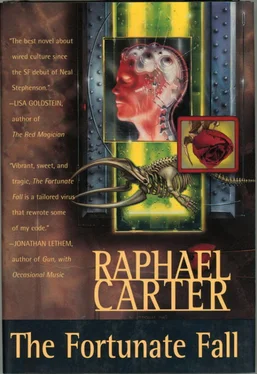Raphael Carter - The Fortunate Fall
Здесь есть возможность читать онлайн «Raphael Carter - The Fortunate Fall» весь текст электронной книги совершенно бесплатно (целиком полную версию без сокращений). В некоторых случаях можно слушать аудио, скачать через торрент в формате fb2 и присутствует краткое содержание. Город: New York, Год выпуска: 1996, ISBN: 1996, Издательство: Tor Books, Жанр: Киберпанк, на английском языке. Описание произведения, (предисловие) а так же отзывы посетителей доступны на портале библиотеки ЛибКат.
- Название:The Fortunate Fall
- Автор:
- Издательство:Tor Books
- Жанр:
- Год:1996
- Город:New York
- ISBN:0-312-86034-X
- Рейтинг книги:3 / 5. Голосов: 1
-
Избранное:Добавить в избранное
- Отзывы:
-
Ваша оценка:
- 60
- 1
- 2
- 3
- 4
- 5
The Fortunate Fall: краткое содержание, описание и аннотация
Предлагаем к чтению аннотацию, описание, краткое содержание или предисловие (зависит от того, что написал сам автор книги «The Fortunate Fall»). Если вы не нашли необходимую информацию о книге — напишите в комментариях, мы постараемся отыскать её.
“Gripping…. One of the most promising SF debuts in recent years”.
—“Publisher’s Weekly” starred review
The Fortunate Fall — читать онлайн бесплатно полную книгу (весь текст) целиком
Ниже представлен текст книги, разбитый по страницам. Система сохранения места последней прочитанной страницы, позволяет с удобством читать онлайн бесплатно книгу «The Fortunate Fall», без необходимости каждый раз заново искать на чём Вы остановились. Поставьте закладку, и сможете в любой момент перейти на страницу, на которой закончили чтение.
Интервал:
Закладка:
“Then how did you find it?”
“I had ever been a starer at stars and a seeker of patterns. I created a chart of the regions in moist memory that viruses attacked; when I noted how often those regions were the same, or fit into each other like puzzle pieces, I was on my way to the answer.”
“You can’t have been the first person to do that.”
“Probably I was not. History does not record the fates of the others, but you may imagine.”
“Why would the Weavers go to so much trouble?” I asked. “Even if they were as bad as you say they are, they’re Weavers. They could just keep the whole plan intact, and call it the next release of Mind-OS.” My spirits lifted, incautiously; the certainty of execution yielded to the dream of commendation. “And if it’s as subtle as all that, maybe they just haven’t found it. Have you tried sending in an anonymous tip? Maybe—”
“Maya Tatyanichna,” he said, “who else but Weavers could create such a subtle and elegant plan? An overnight change in the soul would be detected; those without the new OS would note the difference in those who had it. The Weavers wished to make their change over the course of decades, to escape detection—for after all, they are Weavers, and can take the long view.
“And if that is not enough, I have a further proof: the Weaver virus-cleaning software. Let loose on an incomplete triplet, it detects it, then disables it—by erasing the useless camouflage code. The remaining portion is not detectable by virus scan, but it is just as functional as before.”
“How far has it gone?” I said, beginning to be convinced despite myself. “How much have they changed?”
“These are early days yet. The average person carries ten or fifteen uncompleted triplets, and has completed, at most, one or two. Not much change; but when necessary, the Weavers see to it that it is the right sort of change. They rarely send transgressors to the Postcops anymore; the days of hauling in a galuboy for a suppressor chip are over.”
He paused and looked at me significantly. Yes, I realized; by ceasing to defend the Weavers, I had given up all reason to object.
“Nowadays,” he continued with an air of triumph, “you simply notice the gradual extinction of the desire, and never know why. Or more likely, you never know what desire it is that you are missing in the first place. That is why the galuboy is so elusive. Likewise the Christian: you lose your faith: it’s an old story—who would remark on it, especially now?”
“And what does your Netcast do to help this?”
“Take out the disk,” he said.
I reached up, slid it out of my head, and held it cradled in my hand.
“Woven into the Netcast, in such a way that it cannot be filtered out without destroying the whole, is a countervirus that binds to the triplets more strongly than their true partners, resulting in a harmless variant.”
“Won’t the Weavers just scrub it?”
“When they can,” he said. “But it will not be easy. The telepresence from the whale must have infected nearly half the world already. From such a base, the countervirus will spread more quickly than even the Weavers can burn it out. Furthermore, the countervirus has been years in the designing; it has a better instinct for self-preservation than most human beings. Still, the Weavers would win out, eventually—if people did not care whether or not they were infected.”
“Why would they care? You think that sending out some horror show will make everyone your ally?”
“No,” he said. “No, the countervirus will do that itself. Watch the rumors for the next few weeks very carefully, Maya Tatyanichna. The first thing you will hear is that the countervirus exists. The second thing you will hear is that being infected with it feels very good.”
“Good God. You’re trying to make us a nation of wireheads.”
“Not at all,” he said. “That is only what you will hear. It will be called a drug, and a highly coveted one. But it leaves the brain’s chemistry quite unaffected; in fact it does not feel good at all. It merely creates the compulsion to tell people that it feels good. The Weavers would have Adam cough up the apple; it is only fair that I be allowed to whisper in his ear that the apple is sweet.”
“Mind control,” I said.
“Yes,” he said, nodding. “Nor is that all of it. In those who know enough to be of use, the virus creates a desire to defend it—to alter it in response to changes in the Weavers’ strategy. You might say it makes them its soldiers.”
“Do you have any idea what you’re saying? It’s another Army.”
“Put the disk in,” he said, “and ask me that again. But don’t let it record what I have told you of the countervirus.”
I fumbled the moistdisk back into my head, and repeated: “Isn’t what you’re doing like the Army?”
“It is at the second remove from the Army,” he said. “In order to destroy the Army, the Weavers became like it; in order to destroy the Weavers, I have become like them, which makes me the Army’s grandchild. Have you not realized, from the story that I told you? To kill Derzhavin, I became like Derzhavin; to escape the Army, I took a soldier of my own. They say that you always become the thing you hate, but that is not quite true. An impotent hate need not become its object. But, like the Stone Age savage going to the hunt, you must transform yourself into the image of the thing you would destroy.”
“That’s a hell of an excuse,” I said.
“I excuse nothing; I admit my guilt most freely.” The blue light from the whale’s tank rippled gently across his face. “Remember when I told you that all of my former associates had been discovered by the Post police? It is not thanks to luck, or skill, or better hardware, that I only am escaped alone to tell thee. I survived because I betrayed them. I wired them for telepresence, under the guise of routine repairs, and then created trails that led the Weavers or the Post police right to them. I have sent good people into excommunication; I have seen them fitted with suppressor chips and mindlocks; I have caused their deaths. I have even wired animals and sent them into every form of slaughter—all in order to recover a few instants of memory from the black boxes I fitted them with. I think I hold my principles more dear than most, Maya Tatyanichna, and yet there is not one of them that I have not betrayed. Because sterility must not prevail.”
“So you sacrificed the people to the principle,” I said. “It sounds like a Guardian’s rationalization. Change a couple of words, and it might have come right out of Calin’s diaries.”
“So you do begin to understand.” He nodded slowly and leaned back in his chair. “A Guardian’s rationalization is exactly what it is. Isn’t that what was wrong with my good friend Derzhavin? His were not useless experiments. I suppose they may have saved lives. And everyone who has a socket owes it to him, or to others like him; the socket was invented by years of experimentation on people like me—and on animals, also like me,” he said, smiling without humor. “That is what it means to be a Guardian: to think that individual rights are a dangerous folly, and compassion merely sentiment. The greater good is everything—and a greater good not to be measured empirically, but defined ideologically.
“Isn’t that what I have done? I have sacrificed others to my own conception of what the world should be—a conception that, if it does anything at all, will bring nothing but unhappiness to most of Russia for decades to come. And why? Because I would not permit a Utopia built on the backs of the one percent, of the few remaining dissidents, even those who no longer know what they are—of the galuboy, or the gallow-girl either. And now you begin to suspect, Maya Tatyanichna, why you are here.”
Читать дальшеИнтервал:
Закладка:
Похожие книги на «The Fortunate Fall»
Представляем Вашему вниманию похожие книги на «The Fortunate Fall» списком для выбора. Мы отобрали схожую по названию и смыслу литературу в надежде предоставить читателям больше вариантов отыскать новые, интересные, ещё непрочитанные произведения.
Обсуждение, отзывы о книге «The Fortunate Fall» и просто собственные мнения читателей. Оставьте ваши комментарии, напишите, что Вы думаете о произведении, его смысле или главных героях. Укажите что конкретно понравилось, а что нет, и почему Вы так считаете.












